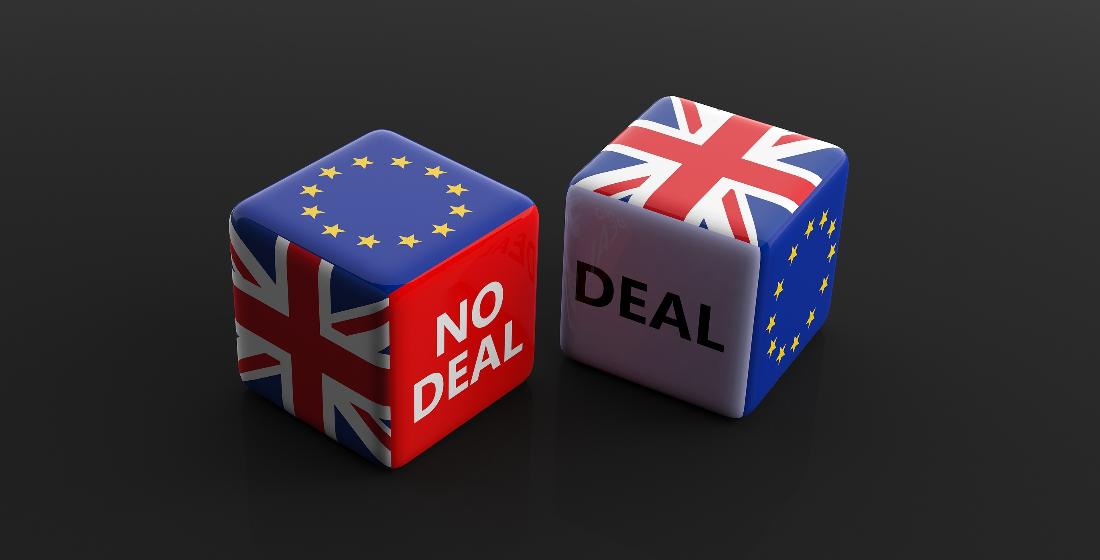Expert briefing: Assessing the possible impact of a hard Brexit
With last minute trade discussions ongoing, the potential of the UK leaving the EU in a ‘no deal’ situation is very real. Whatever the scenario, the wrench from the EU will have a massive impact on many UK companies, but also for other European counterparts too. The devil is always in the detail. Here, Robert Lyons, a specialist business and corporate lawyer at Excello Law, sets out the implications.

 Robert LyonsThe UK and the EU are entering into a key phase of negotiations in terms of their future trading relationship and, as things currently stand, it is becoming increasingly possible that no agreement will be reached on a Free Trade Agreement (FTA) which would mean a hard Brexit with trade between the UK and the EU being conducted on World trade Organisation (WTO) terms.
Robert LyonsThe UK and the EU are entering into a key phase of negotiations in terms of their future trading relationship and, as things currently stand, it is becoming increasingly possible that no agreement will be reached on a Free Trade Agreement (FTA) which would mean a hard Brexit with trade between the UK and the EU being conducted on World trade Organisation (WTO) terms.
Tariffs
There will be a number of additional costs and hurdles to trade once the UK leaves the EU single market and customs union irrespective of whether there is a hard or soft Brexit but a major consequence of a hard Brexit will be that many goods imported from or exported to the EU will be subject to tariffs for the first time in decades.
The UK Department of International Trade has indicated that, under the new UK Global Tariff, they expect 60% of trade will come into the UK tariff-free on WTO terms or through preferential access from agreed FTA’s. This figure could increase to 87% if an FTA is agreed with the EU. However, tariffs on nearly 5,000 product lines will be retained including on agricultural products, ceramics, chemicals, bioethanol and motor vehicles.
Clearly, the UK will have control on the tariffs it sets on its imports but, outside an FTA, it will have no control over the levels of tariffs imposed on its exports.
In a hard Brexit scenario, trade between the EU and the UK will be subject to the most favoured nations (MFN) provisions within the WTO rules. These MFN provisions mean that the UK will not be able to offer more favourable tariff rates to the EU than those offered to other territories it trades with on WTO terms and vice versa.
Each UK/EU business will need to assess whether any of its products or parts will be subject to tariffs. If so, then each such business will need to quantify the cost of the tariffs, assess whether the cost can be passed on to the end consumer or the next in line in the supply chain, determine whether the business is still viable with the new tariff burden and, if so, whether it has adequate working capital facilities to meet the cost of these tariffs.
Some industries eg the motor, agricultural and aviation industries, have developed complex pan-EU supply chains. Components or parts pass through several intermediate production steps before being passed on, often across borders, to the next step in the production cycle and then on to the final assembly plant. The frictionless trade flowing from the EU single market and customs union has allowed these industries to flourish providing for high degrees of specialisation and economies of scale and ‘just in time’ goods delivery. If there is no EU FTA, the cumulative effects of these tariffs on complex supply chains may make these supply chains vulnerable with the result that the EU manufacturers may seek to source their UK supply chain components from elsewhere within the EU.
It will also be important to determine whether any products or parts will be subject to Tariff Rate Quotas (TRQs). TRQs allows a lower rate tariff on imports of a given product up to a specific quantity and requires a higher rate on imports exceeding that quantity. These TRQs are frequently seen in FTAs but are also relevant under the WTO rules.
Non-tariff barriers
Tariffs on goods traded with the EU are only one of the costs of a hard Brexit. Cross border trade in goods and services is also heavily impacted by non-tariff barriers (NTBs). The obvious NTBs are customs controls and declarations and increased paperwork but other NTBs also include cost of compliance with EU product and safety regulations, labelling and packaging requirements, acceptance of EU common health and safety and other standards and processes, limits on immigration and the freedom of movement of people and the loss of mutual recognition and various passporting rights of goods and services.
It should be noted that, since the UK will be leaving the single market and the customs union, many, if not most, NTBs will have an impact on businesses whether a UK/EU FTA is entered into or not. It may be that the terms of a FTA may remove some of these potential NTBs or reduce the impact of others, but it is difficult to see how a FTA between the UK and the EU will be able to cover much more than a deal on tariffs given the short time given to negotiate the FTA. All businesses that trade with the EU will need to start identifying likely NTBs and start to plan for them accordingly.
In 2017 HMRC estimated that the additional administrative costs per year of trade between the UK and the EU following the introduction of customs declarations between the UK and the EU would be in the region of £17 billion to £20 billion of which only some £5 billion would be attributed to tariffs. It was also estimated that between 145,000 and 250,00 UK traders would have to make customs declarations for the first time. These estimates have not been universally accepted and the cost of NTBs will vary from sector to sector but it is clear that NTBs will have a significant impact on the cost and efficiency of UK/EU trade and this impact is likely to increase over time as companies will have to cope with the cost of divergence in technical standards and other regulations.
Businesses trading with the EU will need to become familiar with the latest GB-EU border manual.
It is likely that most SMEs will need to outsource to customs agents, freight forwarders and other professional advisers to ensure compliance with the new tariff and customs requirements and NTB’s. It is important that these relationships be established sooner rather than later since many of these organisations are very stretched resource wise.
Rules of origin
When entering an FTA, the parties to that FTA agree to provide preferential trading terms to goods and services traded between those two countries/trading blocs. Rules of origin have evolved to attribute a country of origin to a product to determine its nationality. For example, the EU does not currently have a full FTA with the USA but if the UK were to enter into an FTA with both the EU and the USA, the EU would want to ensure that the US does not circumvent EU tariffs on US goods by shipping goods to the UK tariff free for forwarding onto the EU. Rules of origin provisions are also relevant for TRQ purposes.
Pre-Brexit, the relevant nationality for UK goods was the EU. Post Brexit, the nationality will be the UK. For many sectors this will not be an issue but, for some, this will be highly problematic. Certain goods eg cars and aircraft are made up of many parts and components.
Pre-Brexit, if the relevant car or aircraft was predominately built within the EU with a largely EU supply chain, then certifying the EU nationality was relatively straightforward. Post Brexit, absent an agreement with the EU, it will become more complicated for both the EU and the UK. Take the case of a car where 55% of its value comes from its pan EU (non-UK) production with 30% of its value coming from the UK. If the EU has an FTA which provides preferential treatment to cars with 65% EU content, pre-Brexit, this would not be an issue but post-Brexit it would be for both the UK and EU entities involved.
There are ways of addressing these issues at governmental level by way of agreeing full or bilateral and diagonal cumulation provisions, but these would effectively require agreement of an FTA with EU. Absent such arrangements being agreed, it may be necessary for supply chains to be revisited. In the above scenario, it may well be that EU manufacturers would seek to source the UK components from elsewhere within the EU to preserve EU nationality with a detrimental impact upon those UK manufacturers in the supply chain.
Conversely, where products are largely UK in origin, there could be opportunities for UK manufacturers where there is a need to increase the UK contribution to the product to ensure UK nationality.
Ascertaining the origin of UK goods will be an additional new cost for many UK companies.
Labour
In the event of a hard Brexit several sectors may be exposed to work force and/or skills related shortages. Many sectors are heavily reliant on EU workers eg agriculture, hospitality, food and drinks, consumer goods, motor and healthcare/domiciliary care sectors. In some of these sectors the largest contribution is in routine and semi routine functions, but this is not consistent across all sectors. Both the financial services sector and the healthcare sector have a significant number of EU workers in professional and management positions.
Retention of existing talent and recruitment of new talent will become more important than ever post Brexit and as we, hopefully, emerge from the Covid-19 lockdown so it is important that businesses work through any Brexit implications for the current and future work force.
Group structures
In anticipation of Brexit, UK businesses should carry out an EU tax, trading, regulatory, social security and pensions audit and review to determine whether any EU group restructuring is required to ensure post 2020 compliance. In particular, will it be necessary to establish EU subsidiaries to benefit from passporting? Will UK incorporated companies lose the benefit of limited liability if those companies are managed from the EU? Will any accounting reporting changes need to be made across the group and will there be any post 2020 changes to any local filing or corporate reporting requirements?
Contract reviews
A review should be carried out of all material contracts involving cross border trade in goods or services to ascertain whether any commercial or drafting changes need to be made to deal with the impact of Brexit. Particular attention should be paid to governing law and jurisdiction clauses and legal formalities eg electronic signature and notarisation requirements. Thought should be given to whether either counterparty to the contract could seek to argue force majeure or otherwise seek to terminate the contract in the light of Brexit. Does the contract provide for who should bear the cost of tariffs and NTBs? Will new tariffs and NTB’s justify seeking to renegotiate the commercial terms of the contract to make them more economic for both sides?
General
A hard Brexit will not impact every business in the same way. Many UK and EU businesses will hardly be directly impacted at all although it is possible that, over time, the macro economic implications of a hard Brexit could have an indirect impact. However, those businesses that trade significantly between the UK and the EU will be impacted and those businesses that operate off small margins, in particular, may struggle to survive unless they can change the way they operate or unless they can find new markets for their products or services. It is imperative that these businesses not only understand the implications and consequences of a hard Brexit but also develop a strategy and a plan to deal with the changes that will be brought about by a hard Brexit.
Robert Lyons is a specialist business and corporate lawyer at Excello Law





